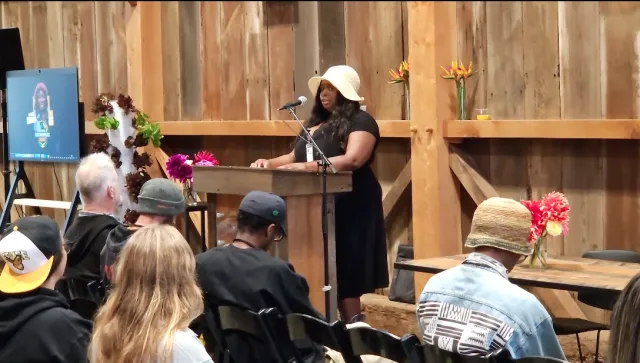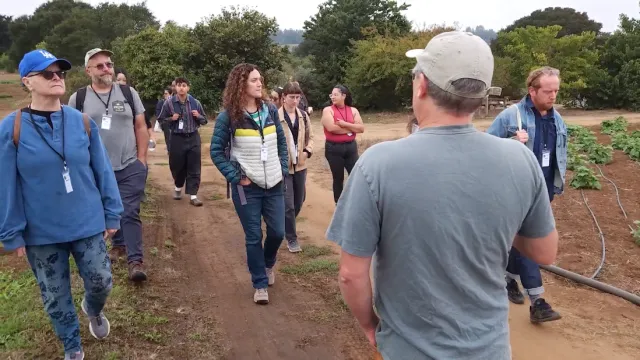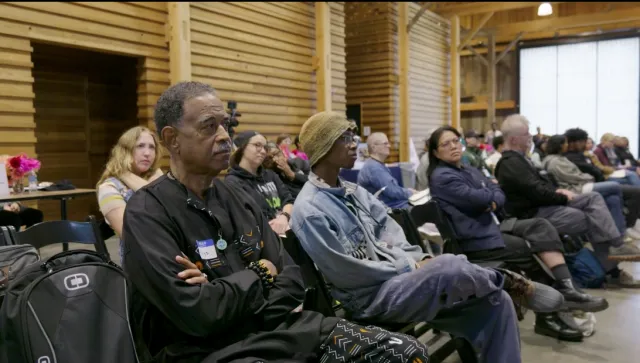
Sheyna Burns advances a vision of cooperative economics for sustainable and inclusive farming
The inaugural California Earthworkers Summit brought together farmers and other food producers in Santa Cruz to discuss approaches to climate, environment, agriculture and food system resilience on Sept. 11–12.
At the UC Santa Cruz Center for Agroecology, people from different backgrounds, sectors and generations shared their knowledge to strengthen the food system. Participants included farmers and representatives of nonprofits, state agencies and community-based organizations focused on equity, ecological sustainability and farming.
Sheyna Burns, a student at UC Santa Cruz, and founder of the Santa Cruz-based nonprofit Square One Foundation, organized the event for “earthworkers,” which she defines as those who work in service of the planet and its inhabitants.
“We operate in silos,” she said, “I think in order for us to build a sustainable and inclusive future, we all need to be in community with each other, planning together. This event is meant to do that. This year's theme is California agriculture and we will expand across the supply chain leading up to our 2030 global summit.”

The summit offered training, matchmaking among food producers and food buyers (including UC and UCANR Procurement) and cash payments for attending select workshops a farmers market. Attendees participated in panel discussions, farm tours and cultural events, plus marketing, grant-writing and policy workshops.
“I'm really excited that UCANR is participating this year supporting food producers across the state,” Burns said.
Among the UC Agriculture and Natural Resources speakers were:
- Darryl Sweet, chief procurement officer for UC Agriculture and Natural Resources
- Julie Katawicz, 4-H youth program representative for Santa Cruz and San Benito counties
- Stepha Velednitsky, 4-H youth development advisor for Contra Costa and Alameda counties
- Hedmon Okella, 4-H animal science advisor based in San Benito, Monterey and Santa Cruz counties
- Cristina Murillo-Barrick, UC Cooperative Extension Black, indigenous and people of color (BIPOC) community development advisor for the Bay Area
- Lilian Thaoxaochay, UC Cooperative Extension disaster resiliency, planning and policy advisor for San Luis Obispo, Santa Barbara and Ventura counties
Alongside representatives of advocacy and community-based organizations, Murillo-Barrick participated in a panel discussing land access and tenure (rights and responsibilities of the people who manage the land) needs and opportunities in California.
“I also shared research and findings from several projects, including the California's Agricultural Land Equity Task Force, UC ANR's Climate Action and Land Equity (CALE) project engagement and the UC's California Organic, Agroecology and Regenerative Transitions project,” Murillo-Barrick said.
She also encouraged summit participants to reach out to UC ANR to explore land access solutions.
At the Procurement Match-Making Session, Sweet discussed UC ANR’s principles of community and resources offered by UC ANR’s statewide programs.
“The farmers are interested in providing crops to Fresh Approach [which promotes locally grown produce] and to UC,” Sweet said. “The other vendors were interested in connecting in case any future projects were made available for small businesses. UC systemwide does have a mechanism to connect local and regional growers to the UC food supply network.”

James Brady, an urban ag-tech consultant from Palm Springs, gave a presentation on vertical farming and controlled environmental agriculture. Brady, who calls himself a moringa ambassador, was encouraging people to plant the herb, which has a long tap root and sequesters carbon.
Farmer Nelson Hawkins, chair of the California Agricultural Land Equity Task Force, said, “I am here as a host, but more importantly, I'm here to network and to build with a lot of brilliant minds in the food system and those that are tackling issues and, challenges that arise when it comes to agroecology and how to apply that in our food system.”
Darryl Wong, executive director of the UC Santa Cruz Center for Agroecology, was excited the event was held at UCSC.
“At UC Santa Cruz and the Center for Agroecology, we have been doing organic for almost 60 years,” he said. “We were innovators back then, and today. We're so happy to host a conference like this that has the same ethos of innovation, but just with a different frame and different populations and different programs.
In addition to UC Agriculture and Natural Resources, sponsors included the California Department of Food and Agriculture, California FarmLink, the Regenerative Farming Collective, the California Climate and Agriculture Network (CALCAN), California Certified Organic Farmers, and Community Alliance with Family Farmers and more.
Burns intends to host another California Earthworkers Summit in August 2026. “As great as this event is this year, it's going to be even better next year,” she said.

